Robynn Murray stood alone in the kitchen. Bread in the toaster, she twirled a butter knife in a tub of Nutella and looked out across the brown Chilmark fields of North Road. She spread the warm bread thick; stuck the knife back in the jar. “I got these when I got back from Iraq,” she said. She licked a crumb of toast from the corner of her mouth and pointed to the two guns tattooed on her chest, their barrels facing each other.
“When I got back, I wanted absolutely nothing to do with guns. All I saw was guns. I was shot at, I shot at people. I was bombed. Then I thought, what a novel idea: guns that don’t shoot people, but shoot smoke and stars.” Ms. Murray enlisted in the U. S. Army October 23, 2002. She was discharged July 11, 2007.
She held out her wrists. “These are my newest ones. Broken rifles.”
She pulled up her shirt. “That’s the last name of my friend. Someone I served with in Iraq. October 2004 he was killed.” She kept her shirt raised above her belly button and pointed down to the strip of skin just above her shorts.
“And these are two doves. One has a peace sign. That one has a bleeding heart.” She pulled her shirt back down and took her toast to the table. She sat, drawing her knees into her chest.
Ms. Murray, 23, has been to Iraq, to Kuwait and to Qatar, was redeployed to Africa and finished out her tour of duty in a seven-month stay at Fort Bragg, N.C., waiting for approval for medical discharge. This week, she added another place to her list: Martha’s Vineyard. A member of Iraq Veterans Against the War since March, she is here for a week-long veterans’ retreat.
They arrived Monday: 26 veterans of the Army, the U.S. Navy, the U.S. Marines Corps, men and women, black and white, from as far as Los Angeles and as close as Burlington. They range in age from their early 20s to their mid 40s. Each fought for this country. Each came home with stories to tell, with memories to shed, with uniforms soiled by sweat, dirt, blood and tears.
The retreat began Monday with a poetry reading at Che’s Lounge. The real work began Wednesday at Seastone Papers in West Tisbury, where the vets ripped apart their undershirts, camouflage shorts and fatigues. They tore fabric from their hats, cut buttons off jackets and shredded their badges. The fabric was combined with water, turned to pulp in a mixer and became paper, which hung on a clothesline Wednesday night before the thunder rolled in: shirts, shorts and blazers torn and reborn as art.
Tomorrow, the retreat will culminate in a public event at the Grange Hall. The veterans will read their poetry and sell their art. It’s a fundraiser for Iraq Paper Scissors, a documentary-in-progress by Sara Nesson, who has been following these and other veterans for the past year.
“The first time I heard it rip, it was kind of hard,” said Nate Lewis, 25, of Barker, N.Y. He’s participated in the papermaking workshops before. He brought more uniforms to the Vineyard this week. “I like showing it. I show it to my family, to my friends. I have boxes of uniforms. Everyone’s got boxes. I have ’em stacked in my parents’ barn. Stacks of green BTU uniforms. Rather than get rid of ’em, I’ll make paper out of ’em. I’d make wallpaper for my whole house if I could, if I had enough.”
Mr. Lewis sat outside at the farm where the vets set up camp this week. Sleeping bags and pillows were scattered around the house, coffee mugs left on windowsills and countertops. On the patio, two former soldiers sat, one strumming the banjo, the other the guitar.
Mr. Lewis held a worn copy of Tim O’Brien’s The Things They Carried, a collection of stories about a platoon of American soldiers in the Viet Nam War. “This is the third time I’ve read it,” he said. Tall and tan with shy blue eyes, he flipped to page 68. He curled and uncurled his toes in the grass as he read aloud: “‘A true war story is never moral. It does not instruct, nor encourage virtue, nor suggest models of proper human behavior, nor restrain men from doing the things men have always done. If a story seems moral, do not believe it. If at the end of a war story, you feel uplifted, or if you feel that some small bit of rectitude has been salvaged from the larger waste, then you have been made the victim of a very old and terrible lie. There is no rectitude whatsoever. There is no virtue.’”
Mr. Lewis joined the military in December, 2003. “I had just finished high school. I didn’t know what I wanted to do. I thought this would be a good way to get college money, to see the world, become a man. My first day of boot camp was September 11. Well, it got pretty crazy from that day on,” he said. “I was involved with the invasion and after that, I got out as soon as possible and stayed out.” After returning home, Mr. Lewis joined Iraq Veterans Against the War and heard about the Combat Paper Project, begun in May 2007 by 26-year-old Iraq War veteran Drew Cameron.
“I first learned paper from my dad,” Mr. Cameron said this week. “When he retired from the military, he went back to school to get his master’s in art education.” After joining the military himself in 1998 at the age of 18 and serving in Iraq for eight months in 2003, Mr. Cameron discharged in 2004 and moved to Vermont. He took a $10 papermaking workshop at a community college and something clicked. “I was drawn to this idea of recreating things into something new,” he said.
The project began one night when Mr. Cameron took his old fatigues out of the closet. “I got completely dressed in my desert uniform. I hadn’t put that thing on my body since Iraq,” he said. “I was thinking about it systematically at first. Where do I cut? Well, I’ll start with my left arm. Then I started feeling this overwhelming feeling of empowerment and emotional expression. I started ripping and pulling at my uniform until I was down to my skivvies,” he said. “I refer to it as an act of liberation.”
Out of the fabric he created what he calls combat paper, paper made from uniforms worn during war. After mixing, moulding and drying the pulp at the Green Door Studio in Burlington, Mr. Cameron hung out sheets of blank paper flecked with green (his fatigues) and threads of brown (his regulation undershirts). From the paper he made books, some blank, some pulp painting with imagery, photographs of himself and his uniform.
He began teaching the craft to other veterans. And he began selling his art to fund the project. “This country now has been at war for seven years. Part of pushing back is music, is writing, is art as much as it is protests and political discussion,” Mr. Cameron said.
Veterans of wars in Iraq, Viet Nam, World War II and Bosnia, have contributed so far. From each new participant, Mr. Cameron takes a piece of fabric and mixes it into what he calls lineage pulp. This pulp is then mixed in with each new batch of pulp, so a little piece of each vet’s uniform is in every new piece of paper made. “The project is collaborative in nature. We carry the strain in each sheet of paper,” he said.
As the workshop began Wednesday, each approached the ripping apart of their uniform differently. Leonard Shelton of Lakewood, Ohio, 44, was carefully cutting buttons from his navy blue Marine Corps jacket. He cut slowly, deliberately, though not with hesitation. “I was in the process of throwing them out when I learned about this and thought, I want to make paper out of this so I can write on it,” he said. “I remember standing in front of the mirror when I got out and saying, who are you? I didn’t know. They told me where to go. They told me what to eat. They told me to cut my hair every two weeks.”
Mr. Shelton joined the marines at the age of 20. In the 1990s, he fought in the Middle East. In 2002, he was shipped to Kosovo. In 2003, right before he was to be sent to Iraq, he was diagnosed with Post Traumatic Stress Disorder and was deemed non-deployable. He retired from the Marines in 2005. After 20 years of service, the check he receives in the mail each month is for $207. “I used to see this advertised and I wanted it so bad. Now, I’m cutting it up,” he said holding a brass button tightly between his fingers. He threw the button into the bucket of scraps.
“Dude, that shit right there? That’s Iraq,” said Aaron Hughes, 26, ripping his fatigues quickly, methodically. When he first heard of the project a year ago, the Chicago native sent his uniform in the mail to Mr. Cameron. When he stepped off the boat Monday, Mr. Cameron handed him a package. “I didn’t know he hadn’t used it until I got here,” said Mr. Hughes, holding out his hand. In his palm were grains of sand, buried since 2004 in the hem of his shorts.
“One year, three months and seven days. I was stationed in Kuwait and drove a truck back and forth to Iraq,” he said. “I have a love/hate relationship with my deployment. I speak against the war, but I still miss my cot. I only had two uniforms and I wore them every day. It was a security blanket. When you’re cold, you wrap yourself in your shirt. You use it as your pillow. But, it’s also a uniform, a symbol of oppression, power, control and obedience. To turn it into something else is liberating.”
Eli Wright held out his camouflage pants. Matt Howard jumped up and grabbed one end and the two began a tug-of-war, laughing and ducking until the first rip gave way. The sound of fabric tearing filled the room and everyone looked up, stopped talking.
Both men have made paper from uniforms before. “Burning them felt liberating,” said Mr. Howard, referring to a night right before his final tour of duty when he threw his camouflage shorts into a bonfire. “But this. This is even more so because it is not just destroying it, but recreating it.” Mr. Howard, 27, now works as a youth empowerment and military coordinator, a fancy name for what he describes as a counter recruiter. He visits classrooms in Vermont, shares his stories and gives students viable alternatives to entering the military.
For Mr. Wright, Wednesday’s workshop was the first he had taken part in since leaving the Army. “I got involved with the project while still in active duty at Fort Drum. I would go up to the Green Door on weekends. It was like a four or five-hour drive. I would go on weekends and make paper,” he said. Mr. Wright, 26, was discharged on June 6 after six years of service. His birthday is Monday, the last day of the retreat. “It will be a nice way to celebrate,” he said. “For the past six birthdays I was either deployed or in the field or in duty, so this is my first birthday in six years.”
Joining the vets Wednesday was Islander Dick Iacovello, a veteran of Viet Nam who lives in Vineyard Haven. “There are some people who maybe feel like this is dishonoring themselves and their commitments. To them, it’s a desecration of the uniforms,” he said as he cut into his army hat. Mr. Iacovello thought he had gotten rid of it all — his uniforms, the suits he had handmade for him in Viet Nam, raincoats he bought there — after leaving the Army in 1963, two weeks before president John F. Kennedy was assassinated. A year and a half ago, he uncovered the hat in a box of storage. It was the last thing which remained. “Me? I think it’s pretty cathartic, you know,” he said as he pulled the cardboard from the hat rim. “It’s letting go.”
In his book, Mr. O’Brien, a Viet Nam veteran himself, has this to say of his characters: “They carried all the emotional baggage of men who might die. Grief, terror, love, longing — these were intangibles, but the intangibles had their own mass and specific gravity, they had tangible weight.” From this weight, these soldiers have made art.
To meet the veterans and view trailers of Iraq, Paper Scissors, visit the Grange Hall in West Tisbury for an evening of film, art, poetry and live music with food, drink and silent auction from 3 to 8 p.m. tomorrow. Film will screen at 5 p.m. and at 7 p.m. Suggested donation is $20 at the door. All proceeds go to help finish the film. Book and art sales will benefit Warrior Writers and Combat Paper projects.
For more information on the Combat Paper Project, see online greendoorstudio.com. For details on Iraq, Paper, Scissors, visit iraqpaperscissors.com.

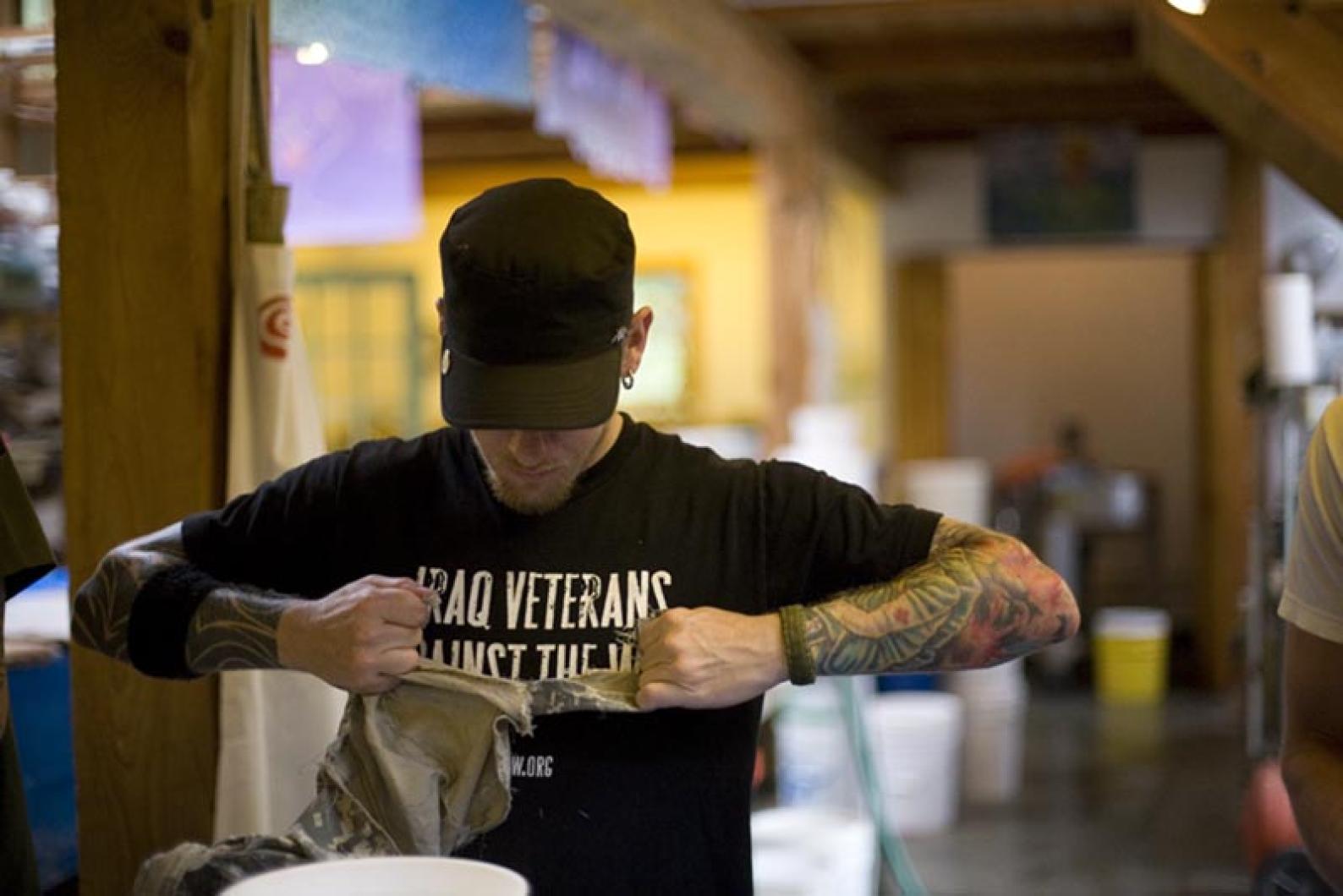
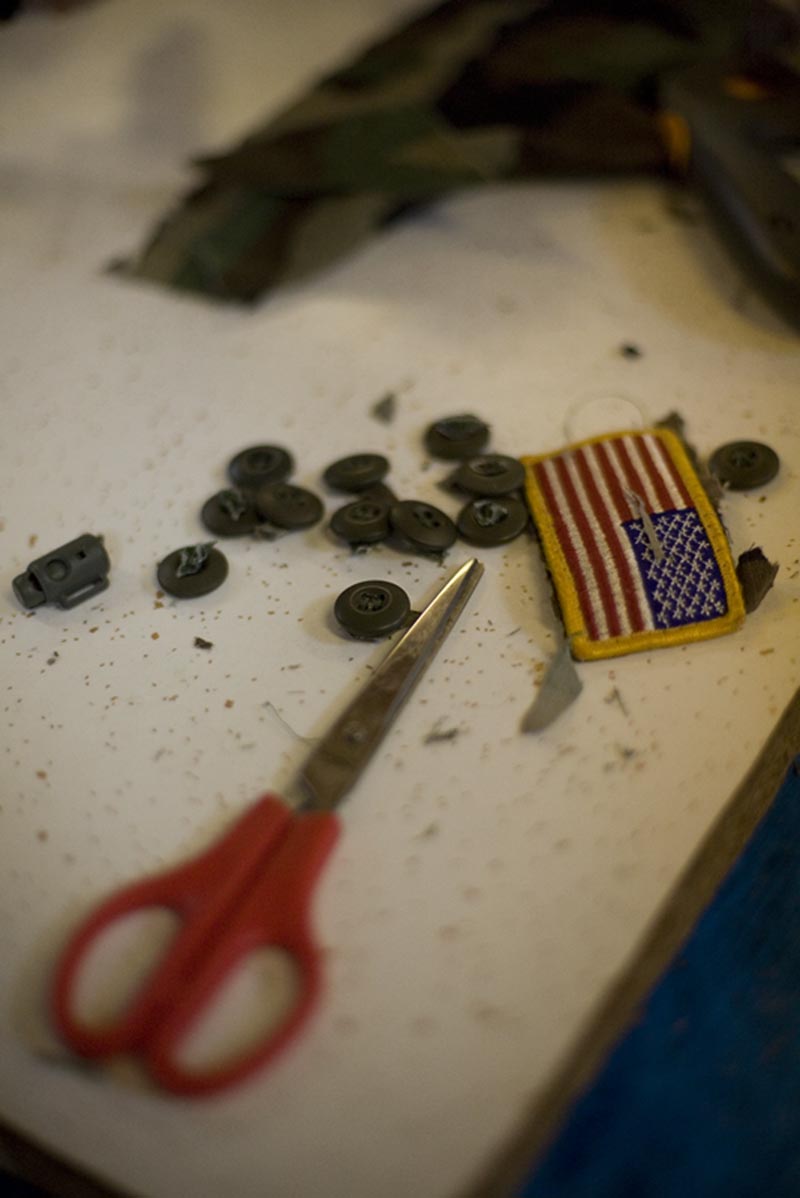
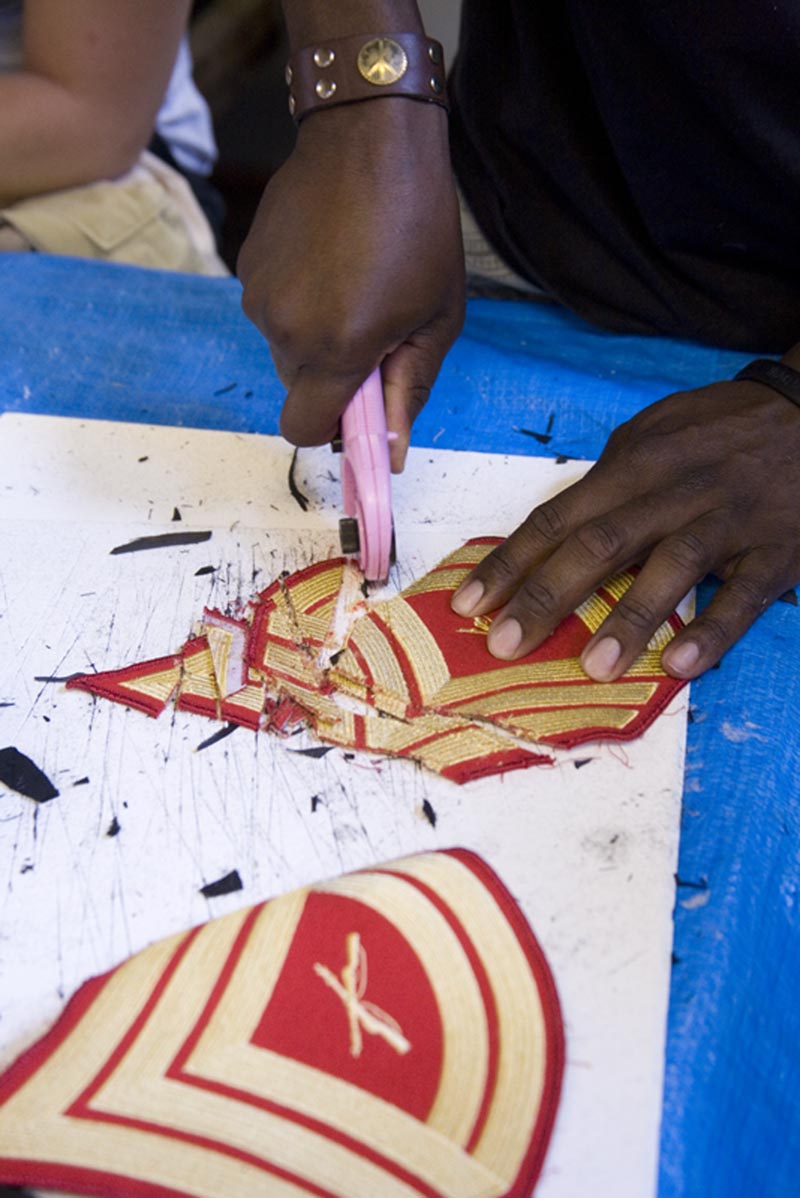
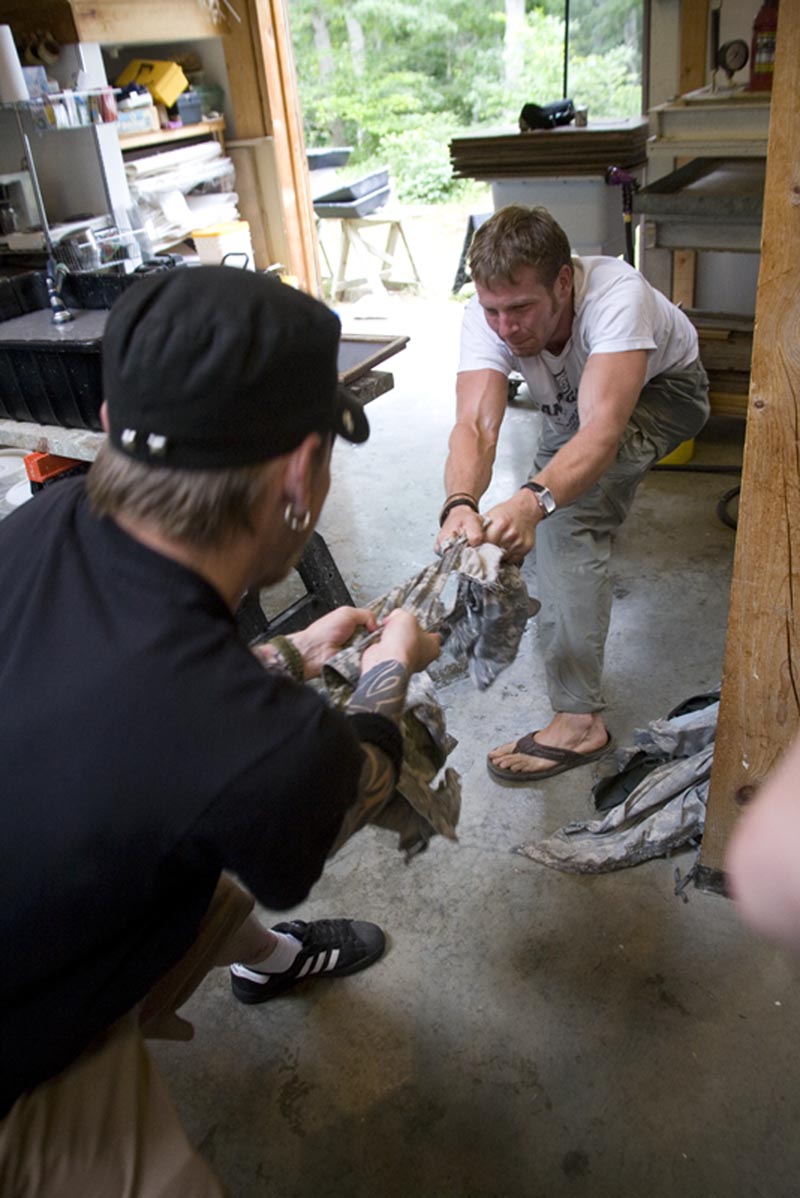

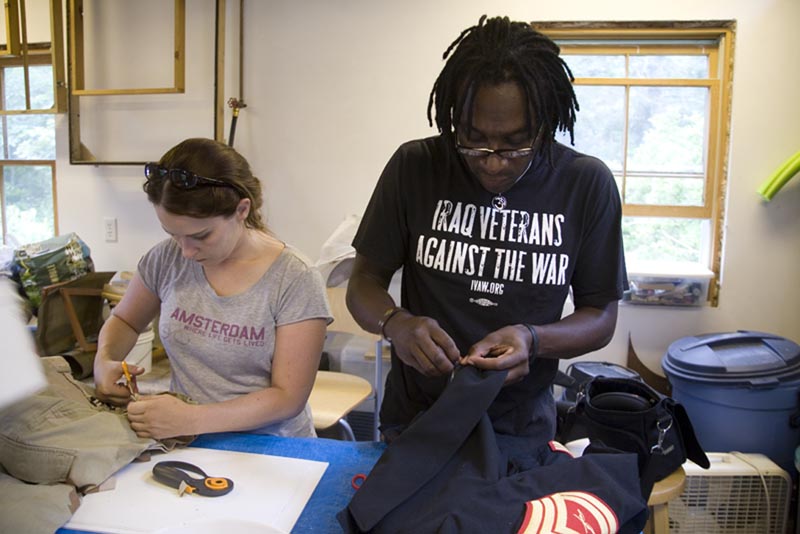


Comments (6)
Comments
Comment policy »